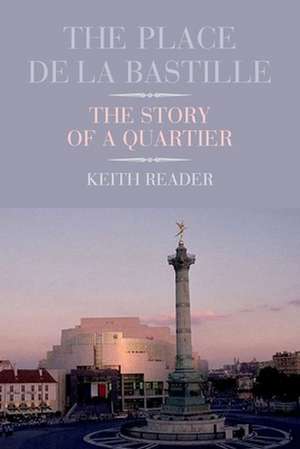The Place de la Bastille – The Story of a Quartier
Autor Keith Readeren Limba Engleză Hardback – 30 apr 2011
From the bustling Marché d’Aligre market to the comparatively new Opéra Bastille, the Place de la Bastille is among the Paris’s most richly protean areas. Also known as the Faubourg Saint-Antoine, the Bastille quarter has long been a bastion of working-class solidarity and a regular site of political agitation—such as the infamous storming of the Bastille. Home to a popular and sometimes raffish nightlife scene in the early twentieth century, it now serves an ethnically and socially mixed community while bearing many traces of its vibrant past.
From the earliest days to the present, Keith Reader offers here a fascinating look at the rich historical and cultural geography of the Place de la Bastille. For readers keen to explore this remarkable area firsthand, the book also includes a map and walking tour.
Preț: 181.35 lei
Preț vechi: 286.09 lei
-37% Nou
Puncte Express: 272
Preț estimativ în valută:
34.70€ • 37.81$ • 29.24£
34.70€ • 37.81$ • 29.24£
Carte indisponibilă temporar
Doresc să fiu notificat când acest titlu va fi disponibil:
Se trimite...
Preluare comenzi: 021 569.72.76
Specificații
ISBN-13: 9781846316654
ISBN-10: 1846316650
Pagini: 184
Ilustrații: 1 map
Dimensiuni: 168 x 240 x 16 mm
Greutate: 0.5 kg
Editura: Liverpool University Press
ISBN-10: 1846316650
Pagini: 184
Ilustrații: 1 map
Dimensiuni: 168 x 240 x 16 mm
Greutate: 0.5 kg
Editura: Liverpool University Press
Notă biografică
Keith Reader is professor of modern French studies at the University of Glasgow and coauthor of French Cinema: A Student’s Guide and The Papin Sisters.
Cuprins
Acknowledgements
Introduction: The Place de la Bastille
1. ‘What’s that poor creature doing here?’: the area and the fortress before the Revolution of 1789
2. ‘Thought blew the Bastille apart’: the fall of the fortress and the revolutionary years, 1789–1815
3. ‘The strategy of the generals of Africa shattered’: the Restoration, Orleanist and Second Republic Years, 1815–1851
4. ‘Where is the noise of the storm that I love?’: The Second Empire from Haussmann to the Commune
5. ‘Satan’s bagpipes’: La Belle Époque’s forty-three years of peace
6. ‘Villains, stars and everybody in between’: The First War and the entre-deux-guerres
7. ‘Slicked hair and splendid sideburns’: Occupation and Liberation
8. ‘Let’s have some sun!’: post-Gaullism and the Mitterrand years
9. ‘A building, not a monument’: the construction of the Bastille Opéra
10. ‘A real earthquake’: the impact of the Opéra on the quartier
11. Flânerie in the archive: the Faubourg/Bastille today
Notes
Bibliography
Index
Introduction: The Place de la Bastille
1. ‘What’s that poor creature doing here?’: the area and the fortress before the Revolution of 1789
2. ‘Thought blew the Bastille apart’: the fall of the fortress and the revolutionary years, 1789–1815
3. ‘The strategy of the generals of Africa shattered’: the Restoration, Orleanist and Second Republic Years, 1815–1851
4. ‘Where is the noise of the storm that I love?’: The Second Empire from Haussmann to the Commune
5. ‘Satan’s bagpipes’: La Belle Époque’s forty-three years of peace
6. ‘Villains, stars and everybody in between’: The First War and the entre-deux-guerres
7. ‘Slicked hair and splendid sideburns’: Occupation and Liberation
8. ‘Let’s have some sun!’: post-Gaullism and the Mitterrand years
9. ‘A building, not a monument’: the construction of the Bastille Opéra
10. ‘A real earthquake’: the impact of the Opéra on the quartier
11. Flânerie in the archive: the Faubourg/Bastille today
Notes
Bibliography
Index
Recenzii
“A wonderful piece of work. Using topography to bring history, anthropology, literature, and the arts into a single focus, the book is also a guide or mode d’emploi for all who have affection for Paris and, more broadly, Gallic culture.”
"What is provocative about this text is an underlying argument that Paris cannot yet be consigned as a living museum. It is this spark which catches fire soon into the book and makes it so entertaining and accessible."—Andrew Hussey, author of Paris: the Secret History
